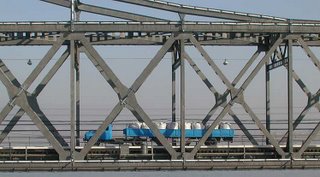Sunday, December 10, 2006
All Hail Toyota!
Wednesday, November 29, 2006
Tuesday, November 28, 2006
Putting the Toothpaste Back Into the Tube
I wrote this on the flight from Narita to Seattle. And so it’s over. For now. Time to mentally put the toothpaste back into the tube, go home, put the ring back into my nose and get back to my same old used to be. Back to responsibilities of work and home ownership and being a 21st century civilized adult male. Oy! If I’ve learned one thing on these recent overseas trips it’s that age brings more impairment than wisdom. My feet hurt. I’m tired. No, I’m exhausted. And my feet hurt. They ache in that kind of needing to have them soaked and massaged kind of way that I’ve never experienced before. Instead of feeling my oats I’m feeling my age. I’m still not sorry that I go to a foreign countries and hit the streets brute force solo. But I fear that soon I’ll have a bigger appetite for overseas travel than my feet can carry. Asia is still calling me. I don’t know why but it still does. And I don’t want to answer that call from a window seat on a tour bus, I don’t want to be spoon fed. The only time I’ve ever taken an organized tour was back in 1984 when I went to Guangzhou because the xenophobic ChiCom (Chinese communist) government of the day said that tours were mandatory for American citizens, no solo travel was allowed. Will I go back to Asia and do it my way again? Hell yes. While I still can.
Saturday, November 25, 2006
Tokyo Pix and Videos
Friday, November 24, 2006
Akihabara and Christmas
 The Japanese have also adopted Christmas. It’s Christmas Jim, but not as we know it. For one thing, except for a small minority there’s no Christ in Japanese Christmas. Never had it, probably never will. But they go nuts with gift giving and trees, ornaments, ribbons, tinsel, Santa Claus and many of the usual trappings of the season. TV this morning was wall to wall with live shots of Christmas lights in Los Angeles and the Macy's Thanksgiving parade in New York. This year a special guest will be showing up in Tokyo, one who loves little children and knows what they want in the true spirit of the season. Michael Jackson is coming to town. Just because it has no religious significance doesn’t mean that stores treat it any differently here. At least in the US we pretend that the holiday is grounded in religion. Sometimes. But in Japan they don't even pretend. Stores play wall to wall Christmas music, some of it with quite religious lyrics. Since most of the population has no idea what the words mean the religion in some of the songs means nothing to them. Maybe the Japanese have more in common with we Americans than I originally thought.
The Japanese have also adopted Christmas. It’s Christmas Jim, but not as we know it. For one thing, except for a small minority there’s no Christ in Japanese Christmas. Never had it, probably never will. But they go nuts with gift giving and trees, ornaments, ribbons, tinsel, Santa Claus and many of the usual trappings of the season. TV this morning was wall to wall with live shots of Christmas lights in Los Angeles and the Macy's Thanksgiving parade in New York. This year a special guest will be showing up in Tokyo, one who loves little children and knows what they want in the true spirit of the season. Michael Jackson is coming to town. Just because it has no religious significance doesn’t mean that stores treat it any differently here. At least in the US we pretend that the holiday is grounded in religion. Sometimes. But in Japan they don't even pretend. Stores play wall to wall Christmas music, some of it with quite religious lyrics. Since most of the population has no idea what the words mean the religion in some of the songs means nothing to them. Maybe the Japanese have more in common with we Americans than I originally thought.
Thursday, November 23, 2006
Morning Coffee Tokyo Style
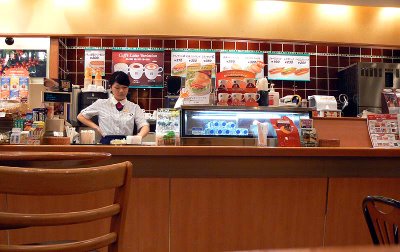
This is a Doutor Coffee shop. One difference from home is that coffee shops don't open until 7am in Tokyo. Another difference is that smoking is just fine in some coffee shops in Tokyo, smokers doesn't seem to carry the social stigma that they do in the US. You can light up nearly anywhere here without getting nasty looks or being considered a pariah. I sat down with my small cup of coffee ($2.20 US) and smelled cigarettes. The salaryman next to me was puffing away. And so was everybody else.  The only person in the place who seemed to give this activity more than a passing thought was me.
The only person in the place who seemed to give this activity more than a passing thought was me.
One woman who appeared to be in her early twenties walked in wearing a surgical mask. Many people here do so that wasn't all that unusual. She ordered her drink, sat down, pulled the mask down exposing her mouth and instead of sipping her drink she lit up and began to puff away. So I guess that not everybody here who wears a surgical mask in public does it for health concerns, maybe it's just a fashion statement.
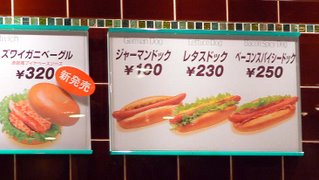 Mmmm, German Dog, Lettuce Dog and Bacon Spicy Dog.
Mmmm, German Dog, Lettuce Dog and Bacon Spicy Dog.Tokyo - Arrived
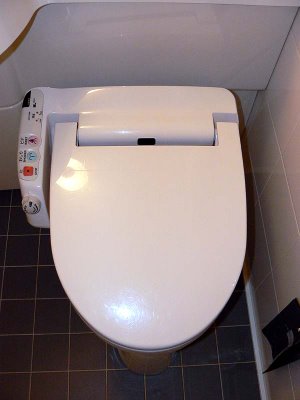

Tuesday, September 19, 2006
Thursday, September 14, 2006
Axis of Evil - Part 1
That's Chairman Mao himself outside of the train station in Dandong. When I decided to focus much of my travel on China I knew that a must see destination would be the northeastern city of Dandong. I wanted to get as close as an American citizen can to Asia’s founding member of the “Axis of Evil”, North Korea. I’ve long been fascinated with the Democratic People’s Republic of Korea or DPRK. The DPRK has been described as a Stalinist Theme Park. If the communism in today’s China can be described as Communism Lite, the DPRK is old school Commie Classic. Stalin’s USSR had no cell phones and neither does the DPRK, they’re banned. Electricity is a sometimes thing as is food. After a bad harvest a few years ago and resulting famine that claimed hundreds of thousands of lives one of the government’s slogans was, “Let’s all eat 2 meals a day”. Anyone with a fast Internet connection can watch canned broadcasts of the nightly news from Pyongyang (http://www.elufa.net/) and understanding Korean isn’t a requirement to notice that things are just a wee bit odd in the DPRK. Since the DPRK is a one party state ruled by the Korean Workers Party and the head of the party, Kim Jong Il, is known as the “Dear Leader” most of the news is about his comings and goings, such as his visits to army bases or to collective farms to dispense “on the spot guidance” and tell farmers in person what they ought to grow or not grow. Or the historic comings and goings of his father Kim Il Sung, the “Great Leader” because the DPRK is the world’s first communist dynasty. In the dead of winter the news often shows office workers in winter coats and vapor streaming from their mouths because in the energy poor DPRK if it’s cold outside it’s cold inside. Does a rocky hillside have to be moved in preparation for new construction? No problem because although the DPRK lacks modern earth moving equipment I’ve seen workers on TV breaking big ones into little ones with sledge hammers and chisels while others dutifully carry off the debris in baskets. I’d love to go and see all this for myself but there are several obstacles:
- American citizens are forbidden entry because although there's an armistice the US and DPRK are still technically at war.
-
Tourists that do make it into the DPRK are assigned minders and their itineraries are set by the government, wandering off alone and mingling with the locals is strictly prohibited.
- Why give money to to aid and strengthen brutal dictators? We’re not talking Gitmo here. Read the Aquariums of Pyongyang; if you don’t catch snakes, lizards, rats and insects to eat while you’re in a North Korean labor camp you die of starvation. After a day of forced mining or logging committing the speeches of the ruling Kim clan to memory is mandatory.
OK, so I couldn't enter the country but I could get up close and peer in. To do so I had to go to Dandong. Dandong is on the Yalu River in Liaoning province and was once a staging ground for Chinese “volunteers” who fought in the Korean War against the US. Today there’s a museum there with the pretentious cold war name of Museum Commemorating the War to Resist American Aggression and Aid Korea.
Dandong is a Seattle sized city of roughly 500,000 people and is the eastern terminus of the Great Wall of China. The Yalu River forms the border between China and the DPRK, right across the Yalu is the North Korean city of Sinuiju. I booked a "Riverview" room at Dandong’s only 4 star hotel, the Zhonglian, a room with a view, a view of North Korea.
See those 2 bridges that my riverview room looked out on? Actually it’s just a bridge and a half. The austere bridge on the left connects Dandong and Sinuiju with one reversible lane for motor vehicles and one railroad track. The half bridge on the right was built during the Japanese occupation of Manchuria and was bombed during the Korean war by the US Air Force in 1950 and was never rebuilt. On the DPRK side only the footings remain. Today the “Broken Bridge” is a tourist attraction, admission 20 Yuan. My admission ticket is below.
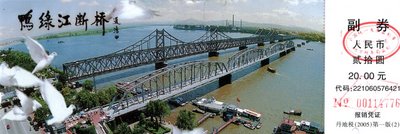
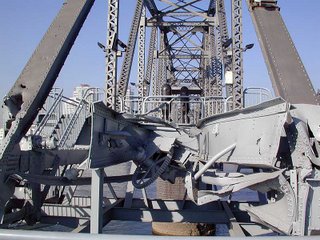
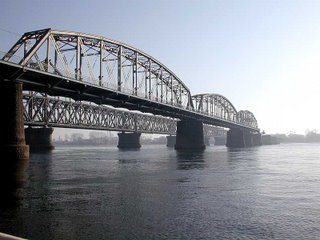
Sinuiju has a slightly smaller population than Dandong but at night it might as well not exist, it's absolutely invisible. At night Dandong is alive with lights, cars and people on the streets or in their electrically lit homes living their lives. At night Sinuiju appears to be dead, maybe the Dear Leader sucked the life out of it. I saw no lights at all except what appeared to be somebody welding. I did see some diffused light off in the distance, I’ve since read that it’s the statue of the Great Leader Kim Il Sung which has the only artificial light in town.
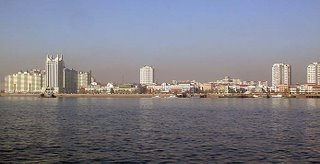
Directly above and below is Dandong as seen from a boat on the North Korean side of the Yalu. It's so prosperous it even has air pollution.
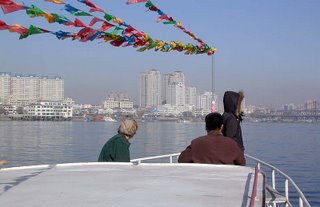
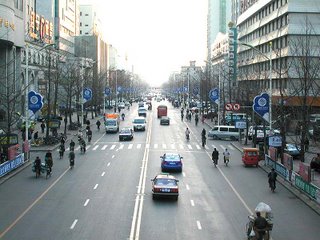


There's not much to see on the Sinuiju side of the Yalu. Plenty of rusting hulks, a few propaganda slogans (this one supposedly proclaims that Kim Jong Il is the light of the sun) and not much else. If rigid communism has any benefits they weren't evident from just offshore.
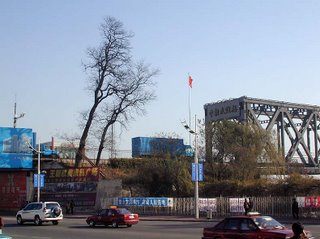
Sunday, September 10, 2006
Axis of Evil - Part 2
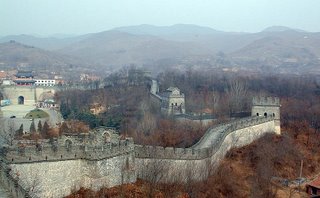 When I was quite sure that I had seen all of North Korea that Dandong had to offer I remembered that Dandong is also the eastern terminus of the Great Wall. I certainly couldn't leave town without seeing the Great Wall so I asked the concierge at my 4 star hotel, the Zhonglian. Her English was passable, certainly better than my Mandarin but she had no idea what I was talking about. She called over a bellboy and they chatted in Mandarin about this strange laowai request. The bellboy also had no idea what I wanted. Temporarily defeated I retreated to my riverview room.
When I was quite sure that I had seen all of North Korea that Dandong had to offer I remembered that Dandong is also the eastern terminus of the Great Wall. I certainly couldn't leave town without seeing the Great Wall so I asked the concierge at my 4 star hotel, the Zhonglian. Her English was passable, certainly better than my Mandarin but she had no idea what I was talking about. She called over a bellboy and they chatted in Mandarin about this strange laowai request. The bellboy also had no idea what I wanted. Temporarily defeated I retreated to my riverview room. 
Admission to the tourist zone cost me another 30 Yuan; I passed on paying for admission to the

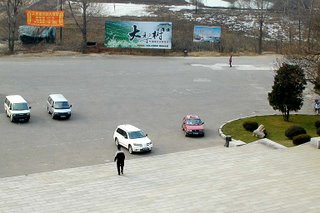
Above: my driver walks back to his red cab. The parking lot was almost empty OK, so the place needed some work. But this is the Great Wall of China! I looked around, it seemed that I had the whole place to myself. But I didn't want to let that cab out of my sight. But there was still plenty to see.
When I got back to the entrance my driver was still there, smoking a cigarette and listening to the radio. He looked at me and asked , “Choson?”, pronounced in a fast bark, Chow-sien. I already knew that the word Choson meant North Korea and thanks to the Internet I knew that the border in this area was just a small creek; perhaps he was offering to show it to me.
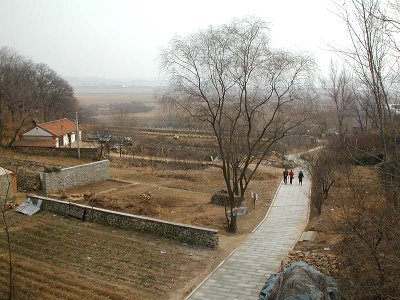

He took me to the creek that forms the border between China and the DPRK and pointed out 2 armed soldiers from the Korean People’s Army in the distance. He started to shout and wave at them. At first they ignored him but they soon started walking our way with their rifles slung over their shoulders. When they got closer a woman selling tourist nick-nacks from a cart indicated that I should buy a carton of cigarettes from her (around $6 US) and throw them across the creek. The soldiers asked who I was, the driver replied that I was an American. The woman indicated that now was the time for me to hurl the carton of smokes into North Korea. I hit the shore with the carton, the soldiers pretended not to notice. But when I lifted my camera up to my eye to get the shot they noticed that and protested loudly. When they walked away without the carton the woman who sold me the cigarettes gestured that it was alright to take a picture. I had read that the soldiers would come back for the cigarettes when there was no one around. So that’s 1/3 of the Axis of Evil. I didn’t see any actual evil on either my boat buzz of Sinuiju or my encounter with the KPA but perhaps the Kim family is keeping their reservoir of evil someplace else where I couldn’t see it.

Monday, August 14, 2006
My Life as a Tourist in China
I first went to China on a lark. In 1982 I was in Hong Kong with some time on my hands so I arranged a 3 day tour of Guangzhou. I made the trip on a ferry sailing up the Pearl river that was boarded by several nervous PLA sailors brandishing AK47s when we crossed into Chinese waters. I don’t much care for organized tours but when China first parted the bamboo curtain that tentative first crack after the death of Mao Zedong in 1976 Americans were only allowed in as part of tour groups. My second trip to China in 2005 was on another lark. I wanted to go somewhere exotic, but not so exotic that the language rendered me functionally illiterate or where I’d be confronted by a strange kind of toilet. I’m an American after all, I have my standards. Hong Kong was just what the doctor ordered. Although Hong Kong became the Hong Kong SAR (Special Administrative Region) in 1997 when the British handed it back the Chicoms in Beijing it has maintained many of its differences from the mainland under the “one country, two systems” policy. That means that unlike on the mainland cars in Hong Kong still drive on the left and have the steering wheel on the right British Empire style. Even though it isn’t widely spoken English is still one of the official languages in Hong Kong, which keeps occurrences of Chinglish down.
Hong Kong is a spectacular world city, for me it was China on training wheels. I enjoyed Hong Kong but I was restless to see what was on the other side of the border. Because even though the Hong Kong SAR is now part of the PRC proper the old pre-handover border remains. Hong Kong has its own customs and immigration services that are separate from those on the mainland. Getting to the border is as simple as boarding a KCRC commuter train and getting off at the last stop, Lo Wu. But I couldn’t cross the border without a visa. In another “one country, two systems” quirk American citizens need no visa to visit Hong Kong, just fly into the airport with a valid US passport and you’re in. But Americans do need a visa to cross the border from Hong Kong to the mainland, even to visit for just a few hours. Lots of inexpensive goods come from China but for American citizens a Chinese visa isn’t one of them. I arranged one through my hotel that cost me more than 800 Hong Kong dollars, that’s more than $100 US. But I wasn’t going to turn up my nose at a day trip to Guangdong province because of the cost. I wanted my all day pass to Chinaland. There are times in one’s life where you just have to open the wallet wide and do what needs to be done. The city on the PRC side of the border is Shenzhen, a bustling metropolis of 5 million that was just a fishing village at the time of Mao’s death. Deng XiaoPing used Shenzhen as a test bed for China’s economic liberalization that in retrospect was wildly successful. Unlike the rest of the mainland, Shenzhen lived economically under communism-lite and its industrial buildup was bankrolled by investors from Hong Kong looking to expand somewhere close to home and attracted by a cheap, Chinese speaking workforce. Wages were low by Hong Kong standards and labor and environmental laws were lax. Shenzhen stoked China’s economic expansion and made the then common “made in Hong Kong” label rare today. I passed through Chinese immigration and out of the train station into Shenzhen and was immediately almost hit by a car. Welcome to Chinese driving where use of mirrors or even eyes is optional and pedestrians have no rights, except maybe to be targets. I passed through Chinese immigration and out of the train station into Shenzhen and was immediately almost hit by a car. Welcome to Chinese driving where use of mirrors or even eyes is optional and pedestrians have no rights, except maybe to be targets. I found the place fascinating. Chinese buses with strange insect antenna-like mirrors plied the streets loudly belching out black exhaust. One Chinese bus manufacturer has the unusual name of “King Long”, which to me sounds better suited to a male porn star than to an outfit that makes mass transit vehicles. Look, here’s Deng Xiao Ping and one of the new businesses in booming Shenzhen:
Because China is the wild, wild east and anything goes, except anything contrary to the edicts of the Communist Party. Just ask the Falun Gong.
Tuesday, June 13, 2006
Littlesheep
China may not have had any advertising during the time of Mao but they’re making up for lost time. There are billboards everywhere, subway cars adorned in NASCAR like advertising both inside and out, abundant commercials on CCTV state television and even a cable shopping channel. Many of the faces used in advertising to the Chinese people are Cantopop or Taiwanese pop stars but a significant number of the faces used in Chinese advertising are Caucasian. Why? When I brought this to the attention of an instructor of a mandatory race and social justice class at work she explained that it was just another example of white racism and white privilege. But she’s never been to China and white racism seemed to be her answer to every question in the spirit of, “If all you have is a hammer, everything looks like a nail”. Here’s an example, on trips to China I bought a bag for my laptop and a small belt bag made by a company called Littlesheep. The bags were of good quality and very reasonably priced. Here’s the tag that I clipped off the computer bag, both front and rear (click to enlarge): 

The couple in the picture probably don't live in China and they don't look like 99.9% of Littlesheep's target market. But my guess is that to the average Chinese shopper they represent the good life, one filled with lots of stuff and plenty of leisure time and after decades of suffering and sacrifice caused by the economic missteps of clumsy communism who wouldn't want that? Here's another example from Shanghai that I shot in November 2005 on HuaiHai Rd, Shanghai's main fashion street
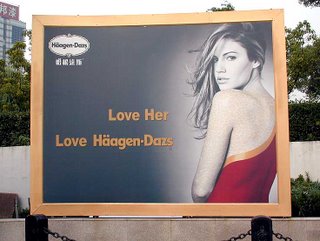 Here's the webpage of Haagen-Daz China. See anybody Chinese there? It's not just foreign companies that do this either. Here's the website of a Chinese clothing manufacturer, Vider. No Chinese faces here either. Zhonghuacar is a subsidiary of Brilliance Auto, a Chinese company that makes BMW and Mitsubishi knockoffs as well as genuine Chinese made BMW’s. It’s definitely a Chinese company, Zhonghua in Chinese means China. Does anybody have an explanation for this?
Here's the webpage of Haagen-Daz China. See anybody Chinese there? It's not just foreign companies that do this either. Here's the website of a Chinese clothing manufacturer, Vider. No Chinese faces here either. Zhonghuacar is a subsidiary of Brilliance Auto, a Chinese company that makes BMW and Mitsubishi knockoffs as well as genuine Chinese made BMW’s. It’s definitely a Chinese company, Zhonghua in Chinese means China. Does anybody have an explanation for this?
Saturday, June 10, 2006
Pandas!
They sure are cute but, they're bears. They eat bamboo and not much else. Before I visited the Chengdu Research Base of Giant Panda Breeding in Sichuan province I'd never seen bamboo growning before. The Chinese government has sent a few giant pandas to North America.
Pandacams: You can see the pandas at the National Zoo in Washington, DC here: http://nationalzoo.si.edu/Animals/GiantPandas/default.cfm?cam=LP2 The San Diego Zoo has giant pandas too, you can them here: http://www.sandiegozoo.org/zoo/ex_panda_station.html
Richgate - "Kinging the Shanghai Buildings"
Meet Satan, Shanghai condo developer. This poster flogging this condo project, supposedly the toniest in Shanghai, strikes me as sinister. Who else but Satan himself could get away with a name like Richgate in a supposedly communist country?
 Naturally a development this gaudy and over the top deserves an equally gaudy website (in Chinglish).
Naturally a development this gaudy and over the top deserves an equally gaudy website (in Chinglish). 
Sunday, May 28, 2006
Chinglish Choice
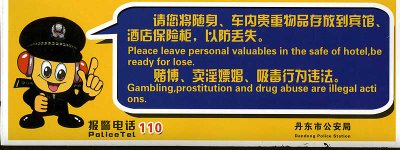 I get it, leave valuables in the hotel safe or they could get stolen. Or, “be ready for lose”.
I get it, leave valuables in the hotel safe or they could get stolen. Or, “be ready for lose”.
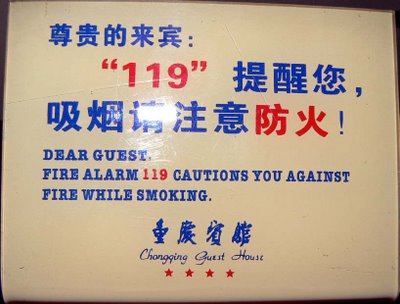 Every blog on China seems to have some obligatory Chinglish and it would be bad ju-ju for me to upset this tradition. As for just what Chinglish is check out Wikipedia's extensive entry Many humerous examples here: http://www.engrish.com/ There's no need to hunt down Chinglish in China, it's everywhere so it finds you. It's usually well meaning on the part of the writer and I still wonder why the Chinese think it's necessary to have English (or their own unique interpretation of it) everywhere. I'm glad that they do it, it means that I can read street signs and figure out where I'm going on the metro and get just a little bit less lost.
Every blog on China seems to have some obligatory Chinglish and it would be bad ju-ju for me to upset this tradition. As for just what Chinglish is check out Wikipedia's extensive entry Many humerous examples here: http://www.engrish.com/ There's no need to hunt down Chinglish in China, it's everywhere so it finds you. It's usually well meaning on the part of the writer and I still wonder why the Chinese think it's necessary to have English (or their own unique interpretation of it) everywhere. I'm glad that they do it, it means that I can read street signs and figure out where I'm going on the metro and get just a little bit less lost.
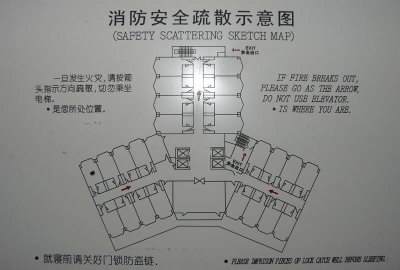
Behold! Maybe this is the origin of the phrase "Chinese Fire Drill". I found this on the inside of the door of my room at the Jin He Hotel in Chengdu.
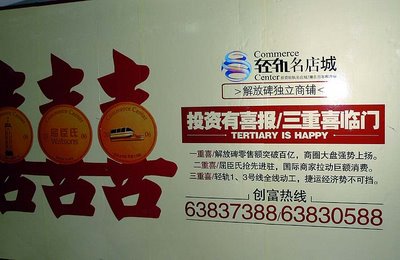 Like most Chinglish the true meaning can be grasped after some thought. I found this one outside of a monorail station in Chongqing. It shows 3 businesses that have done well in the shopping center by the monorail. So "Tertiary Is Happy" probably means that good things come in threes. Or not.
Like most Chinglish the true meaning can be grasped after some thought. I found this one outside of a monorail station in Chongqing. It shows 3 businesses that have done well in the shopping center by the monorail. So "Tertiary Is Happy" probably means that good things come in threes. Or not.

Just a misspelling, I hope.
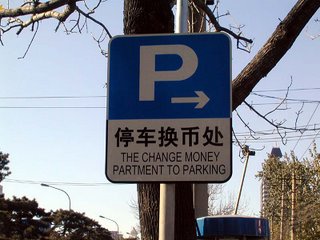
From Beijing: I have no clue of what they were trying to tell me. Change for parking? Since only a complete stark staring suicidal lunatic would attempt to drive in any Chinese city I didn't have to concern myself with whatever this is.
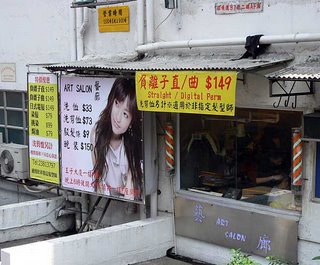
This one's from Hong Kong. English is one of Hong Kong's official languages so they ought to know better, unless I'm not up on my art and fashion and there is something called a digital perm.
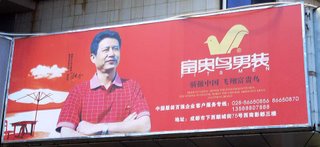 Check this guy out, I shot this billboard in Chengdu. The text says, "The strongest potential makes the Chinese arrogant Men's clothing brand". Change the word arrogant to confident and it suddenly makes more sense.
Check this guy out, I shot this billboard in Chengdu. The text says, "The strongest potential makes the Chinese arrogant Men's clothing brand". Change the word arrogant to confident and it suddenly makes more sense.

This is from Dandong on the North Korean border. I found it outside a men's room. It means more than just keep the place clean.
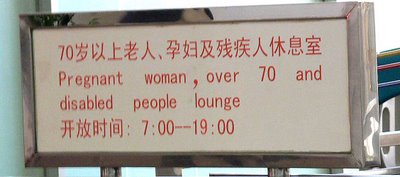
The message is helpful, noble yet strangely phrased.
